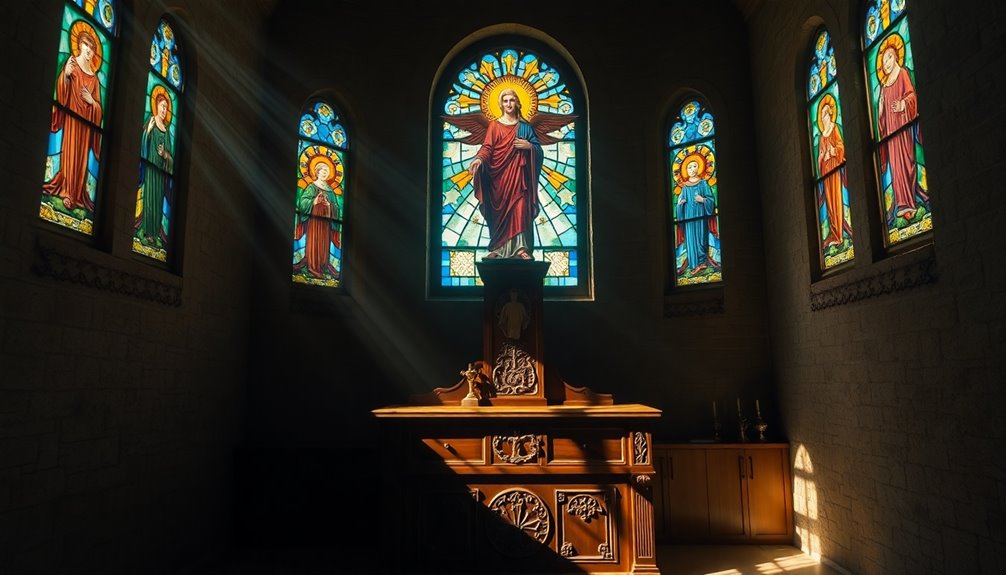The Seven Spirits of God represent the diverse attributes of the Holy Spirit, emphasizing His complete and multifaceted nature. Rooted in Isaiah 11:2, they include the Spirit of the Lord, Wisdom, Understanding, Counsel, Strength, Knowledge, and Fear of the Lord. This number seven symbolizes totality and perfection, highlighting the Holy Spirit's work in your life. Often misunderstood as separate beings, they truly reflect the unified essence of the Spirit. By exploring the significance of each attribute, you can deepen your spiritual understanding and experience the fullness of the Holy Spirit's presence. There's much more to discover!
Key Takeaways
- The Seven Spirits of God represent diverse attributes of the Holy Spirit, emphasizing completeness of character rather than separate entities.
- They include the Spirit of the Lord, Wisdom, Understanding, Counsel, Strength, Knowledge, and Fear of the Lord, as rooted in Isaiah 11:2.
- The number seven symbolizes totality and perfection, highlighting the Holy Spirit's comprehensive work in believers' lives.
- Key biblical references include Revelation 1:4, 3:1, 4:5, and 5:6, which illustrate the multifaceted nature of the Holy Spirit.
- Daily spiritual practices, like prayer and reflection, can foster a deeper understanding and connection with the attributes of the Seven Spirits.
Introduction

The Seven Spirits of God represent a profound aspect of the Holy Spirit's nature, reflecting His diverse attributes and divine qualities. Mentioned in both the Book of Revelation and Isaiah, these spirits illuminate the multifaceted character of God. They include the Spirit of the Lord, Wisdom, Understanding, Counsel, Strength, Knowledge, and Fear of the Lord. Each one highlights specific attributes that showcase how the Holy Spirit operates in believers' lives.
Rooted in Isaiah 11:2, the sevenfold description emphasizes the completeness and perfection of God's presence. This completeness is essential for a full understanding of how the Holy Spirit guides and empowers you.
In Revelation, the Seven Spirits are depicted as being before God's throne, often symbolized as seven lamps or eyes. This imagery signifies illumination and divine insight, further illustrating the role of the Holy Spirit in your spiritual journey.
The number seven holds significant meaning in biblical numerology, symbolizing completeness and perfection. This reflects the totality of the Holy Spirit's work, ensuring that you have access to divine guidance, wisdom, and strength in every aspect of your life.
Key Biblical Texts

When you explore the key biblical texts regarding the Seven Spirits of God, you'll find crucial references in both Revelation and Isaiah.
These passages highlight their significance and the attributes associated with the Holy Spirit.
Understanding these texts will deepen your appreciation for the multifaceted nature of God's Spirit.
Primary Bible References
In key biblical texts, the Seven Spirits of God are prominently mentioned in the Book of Revelation, highlighting their importance in understanding the nature of the Holy Spirit. You can find specific references in Revelation 1:4, 3:1, 4:5, and 5:6. In these passages, the Seven Spirits are depicted as being before God's throne, emphasizing their active role in divine presence.
Isaiah 11:2 from the Old Testament outlines the sevenfold nature of the Holy Spirit, identifying these spirits as: the Spirit of the LORD, Wisdom, Understanding, Counsel, Strength, Knowledge, and Fear of the LORD. This connection enriches your understanding of the Seven Spirits as not just symbolic but deeply rooted in Scripture.
In Revelation 4:5, the Seven Spirits are illustrated as seven burning lamps, symbolizing illumination and the vibrant presence of the Holy Spirit. Revelation 5:6 further identifies them as the seven eyes of the Lamb, indicating divine insight and awareness across the earth.
The number seven often signifies completeness and perfection, reinforcing the significance of the Seven Spirits as a representation of the fullness of the Holy Spirit.
Secondary Bible References
Scriptural references beyond Revelation deepen your understanding of the Seven Spirits of God. In Isaiah 11:2, you discover the Spirit of the LORD and its seven attributes: Wisdom, Understanding, Counsel, Strength, Knowledge, and Fear of the LORD. These qualities reflect the fullness of the Holy Spirit's presence, giving you insight into His multifaceted nature.
Revelation 4:5 describes the Seven Spirits as seven burning lamps before God's throne, symbolizing illumination and the active presence of the Holy Spirit in your life. This imagery connects to the seven churches mentioned in Revelation, where the spirits serve as a guiding force for believers, emphasizing their role in spiritual oversight and empowerment.
Additionally, Zechariah 4:1-14 links the seven spirits to the eyes of the LORD, reinforcing the idea of divine oversight. The number seven frequently symbolizes perfection and completion in Scripture, highlighting that the Seven Spirits signify the complete ministry of the Holy Spirit.
Understanding these secondary references enriches your perspective on the Seven Spirits, reminding you of their vital role in your spiritual journey and relationship with God.
Early Church Understanding

The early Church viewed the Seven Spirits of God as a profound representation of the Holy Spirit's diverse attributes, pulling from Isaiah 11:2 for deeper understanding. Church fathers and theologians emphasized that the number seven symbolizes completeness and perfection, reflecting God's authority and presence in believers' lives.
This theological foundation shaped how you might understand the roles of the Holy Spirit in guiding, empowering, and illuminating the faith community.
In early Christian writings, the Seven Spirits were frequently linked to spiritual gifts, showcasing the multifaceted nature of the Holy Spirit's work among the faithful. You'd see that interpretations varied; some theologians viewed the Seven Spirits as distinct manifestations of the same Holy Spirit, while others focused on their collective representation of God's fullness.
Incorporating the Seven Spirits into liturgical practices, the early Church encouraged the faithful to invoke their attributes in prayers and communal worship. This practice allowed believers to seek divine guidance and wisdom, reinforcing the importance of the Holy Spirit in their lives.
Ultimately, these early understandings laid a significant groundwork for how you view the Holy Spirit today.
Symbolism of the Seven Spirits

Understanding the symbolism of the Seven Spirits of God reveals the rich tapestry of the Holy Spirit's attributes and their significance in believers' lives. The seven spirits can't be seen as mere abstract concepts; they embody essential qualities such as wisdom, understanding, counsel, strength, knowledge, fear of the Lord, and the Spirit of the Lord. This seven-fold description highlights the multifaceted nature of the Holy Spirit, inviting believers to experience the fullness of the Spirit.
In Revelation, the Seven Spirits are depicted as seven burning lamps before God's throne, symbolizing illumination and the complete presence of the Holy Spirit. This imagery emphasizes divine perfection and completeness, as the number seven in biblical terms frequently denotes wholeness. Each spirit represents distinct aspects of God's character, encouraging you to seek these qualities in your own spiritual journey.
As you engage in your community and personal life, reflecting on these attributes can empower you to navigate challenges with divine guidance. By embracing the symbolism of the Seven Spirits, you deepen your understanding of the Holy Spirit's role in your life and become more attuned to God's presence and authority.
Misunderstanding the Spirit's Roles

You might find that many people confuse the Seven Spirits of God as separate beings when they actually represent the diverse attributes of the Holy Spirit.
This misunderstanding can stem from misinterpretations of scripture, especially in Revelation, where the imagery can be misleading.
Debunking Common Misconceptions
Misconceptions about the Seven Spirits of God can lead to a fragmented view of the Holy Spirit's true nature. Many people mistakenly believe that the seven spirits are separate entities or angels. In reality, they represent the multifaceted nature of the one Holy Spirit, as described in Revelation and Isaiah. Each spirit—Spirit of the Lord, Wisdom, Understanding, Counsel, Strength, Knowledge, and Fear of the Lord—embodies distinct attributes that together illustrate the complete character of the Holy Spirit.
The number seven symbolizes perfection and completeness in biblical numerology, emphasizing that the Seven Spirits reflect the fullness of God's presence in believers' lives. When you view these spirits as individual beings, it can create confusion about the Holy Spirit's unity and purpose. Instead, recognize them as various manifestations that work harmoniously to fulfill God's plans.
Understanding the Seven Spirits encourages you to seek these divine attributes in your spiritual journey. The Holy Spirit actively guides, empowers, and equips you, highlighting the importance of embracing these characteristics as you grow in faith.
Misinterpretation of Scriptural Context
Recognizing the multifaceted nature of the Seven Spirits of God is key to grasping their true roles within the context of Scripture. The common misinterpretation arises when you view these spirits as separate entities rather than attributes of the singular Holy Spirit. Isaiah 11:2 describes the Holy Spirit in a sevenfold manner to emphasize the completeness of His character, not to suggest seven distinct spirits.
You might also encounter the misconception that the Seven Spirits equate to angelic beings. However, they better represent the divine qualities and roles of the Holy Spirit in guiding and empowering believers.
The symbolic use of the number seven in the Bible often signifies perfection and completeness, a detail that's frequently overlooked. This oversight can lead to a skewed understanding of the significance of the Seven Spirits in relation to God's authority and action.
Furthermore, ignoring contextual connections between the Seven Spirits and other biblical passages, like Zechariah's vision, leaves you with a fragmented understanding of the Holy Spirit's role in establishing God's kingdom.
Embracing a more holistic view can deepen your appreciation for the Spirit's work in your life.
Daily Spiritual Practices

Incorporating daily prayer for guidance can significantly enhance your spiritual journey by inviting the Seven Spirits of God into your life.
Participating in group Bible study sessions not only deepens your understanding but also fosters a sense of community among fellow believers.
Together, these practices create a powerful framework for aligning your actions with God's will.
Daily Prayer for Guidance
Each day offers a fresh opportunity to seek divine guidance through prayer, especially by invoking the Seven Spirits of God. By setting aside time for prayer, you can ask for the Spirit of counsel and the Spirit of knowledge to illuminate your path.
This structured approach encourages you to reflect on how each spirit's attributes can manifest in your life. As you pray, consider the importance of the Fear of the Lord, which fosters a deep reverence for God's wisdom.
Embrace the Spirit of understanding to enhance your perception of spiritual truths and the Spirit of strength to empower you in facing life's challenges. Engaging in daily prayer not only helps you navigate decisions but also deepens your relationship with God.
By consistently invoking the Seven Spirits of God, you cultivate spiritual maturity and gain insight into your journey. Each attribute offers unique guidance, allowing you to embody these qualities in your personal and communal contexts.
Through this practice, you invite divine insight into your daily life, creating a stronger foundation for growth and understanding in your spiritual walk.
Group Bible Study Sessions
Group Bible study sessions provide a dynamic way to deepen your understanding of the Seven Spirits of God. By exploring the attributes of the Spirit of the Lord, Wisdom, Understanding, Counsel, Strength, Knowledge, and Fear of the Lord from Isaiah 11:2, you'll gain insights that can enhance your spiritual growth.
Engaging with others in these group sessions allows you to reflect on how these spirits manifest in your life, encouraging personal transformation. Weekly discussions can delve into relevant biblical passages, such as Revelation 4:5 and Revelation 5:6, where the Seven Spirits are depicted as seven lamps and eyes.
This symbolism highlights the completeness of the Holy Spirit's ministry and invites deeper contemplation. Incorporating prayer and worship centered on the attributes of the Seven Spirits fosters community bonding and collective spiritual empowerment.
Additionally, utilizing resources like the Elisha Revolution app can provide valuable materials and insights, enriching your exploration of the Seven Spirits and their impact on your daily life.
Seven Spirits' Significance Explained

The significance of the Seven Spirits of God goes beyond mere symbolism; it reflects the comprehensive nature of the Holy Spirit's work in our lives. Mentioned in Revelation, the Seven Spirits embody the completeness and perfection of God's presence, highlighting the multifaceted attributes of the Holy Spirit.
Each spirit—Spirit of the LORD, Wisdom, Understanding, Counsel, Power, Knowledge, and Fear of the Lord—reveals a distinct characteristic that enriches our spiritual journey.
The number seven signifies perfection in biblical numerology, emphasizing the totality of the Holy Spirit's influence in believers' lives. When you understand these attributes, you open the door to deeper theological discussions about spiritual gifts. This understanding encourages you to actively seek these qualities for both personal growth and communal unity within the church.
The imagery of the Seven Spirits as burning lamps in Revelation symbolizes illumination, representing the Holy Spirit's active presence guiding and empowering the church.
Additional Resources

To deepen your understanding of the Seven Spirits of God, exploring a variety of resources can be incredibly beneficial. Start by diving into the book of Revelation, particularly chapters 1, 3, 4, and 5, where the Seven Spirits are mentioned in relation to God's throne. These passages illustrate how the Holy Spirit operates as a multifaceted presence in our lives.
Additionally, Isaiah 11:2 provides insight into the characteristics of the Seven Spirits: the Spirit of the Lord, Wisdom, Understanding, Counsel, Strength, Knowledge, and the Fear of the Lord. Each aspect plays a vital role in your spiritual growth, helping you to recognize the diverse ways the Holy Spirit influences your journey.
You might also consider commentaries or study guides that focus on the symbolism of the Seven Spirits as lamps in Revelation 4:5. This imagery emphasizes the illumination and active ministry of the Holy Spirit in the world.
Engaging with these resources won't only enhance your knowledge but also empower you to live out your faith more fully, embracing the completeness represented by the Seven Spirits.
Frequently Asked Questions
What Are the Seven Spirits of God in the Bible?
In the Bible, the concept of the seven spirits refers to various attributes of the Holy Spirit.
You might find these spirits mentioned in Isaiah 11:2, where they include Wisdom, Understanding, Counsel, Strength, Knowledge, Fear of the Lord, and the Spirit of the Lord.
Each aspect highlights different qualities of the Holy Spirit, emphasizing His multifaceted role in your spiritual journey and the completeness of God's presence in your life.
What Are the Seven Names of the Holy Spirit?
You might find that the Holy Spirit is often associated with various names that reflect its attributes.
These include the Spirit of the Lord, Wisdom, Understanding, Counsel, Strength, Knowledge, and Fear of the Lord.
Each name represents a unique aspect of the Holy Spirit's character and its role in guiding and empowering believers.
Understanding these names can deepen your relationship with the Holy Spirit and enhance your spiritual journey.
What Are the 7 Powers of the Holy Spirit?
The seven powers of the Holy Spirit equip you for a deeper spiritual life.
You experience divine strength that empowers your actions and decisions. Wisdom guides you in making choices aligned with God's will, while understanding helps you grasp spiritual truths.
Counsel provides direction in challenging times, and knowledge deepens your relationship with God.
Lastly, the fear of the Lord cultivates reverence and awe, helping you stay grounded in your faith journey.
What Are the Seven Spirits and Seven Stars in Revelation?
In Revelation, the seven spirits represent the fullness of the Holy Spirit, signifying divine presence and illumination.
The seven stars are identified as the angels of the seven churches, providing guidance and oversight.
Together, they emphasize God's authority and the importance of spiritual leadership within the Christian community.
As you explore these symbols, consider how they reflect the multifaceted nature of divine influence in the lives of believers and their congregations.










